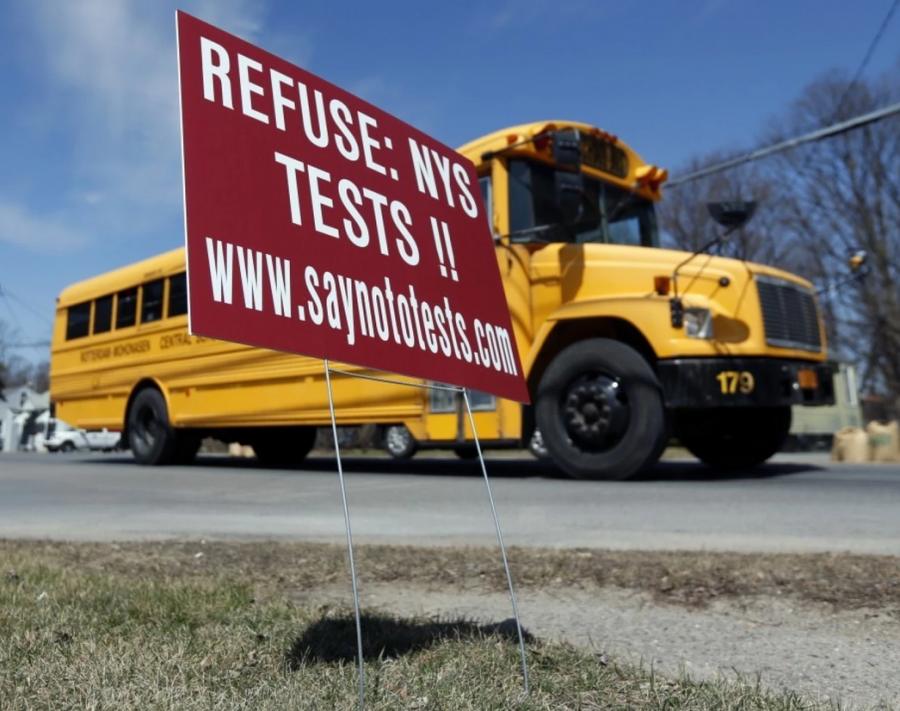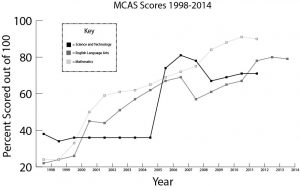First published May 22, 2015.
by Emily Moss
This past week, sophomores took the MCAS test. Next year at this time, it is possible that students will instead take the PARCC test, an assessment whose difficulty level has raised widespread concern in schools across the country.
A student who was selected for a field-testing of PARCC last year noted, “PARCC was far harder than any MCAS test I’ve ever taken… I don’t think it should be implemented in school systems if they do not make any changes to it.”
After administering the test for the first time this year, the literacy specialist and PARCC coordinator at Burr Elementary School said, “I hope parents will throw them [the results] out without ever telling their children… Data is only as good as the instrument you use.”
The implementation of PARCC is just one component of a larger effort to align state curricula to a set of standards known as the Common Core. Although the standards are meant to improve and equalize education, they have grown increasingly controversial since being introduced in 2010, becoming a topic of debate everywhere from Newton classrooms to White House offices.
Those who support the Common Core Standards believe that they will help provide equal educational opportunities for students across the country and will promote higher-level thinking skills. Others strongly oppose the standards, arguing that the concept of implementing the same educational requirements across states and school systems is unrealistic and possibly even unconstitutional. Still others feel that schools implementing the Common Core must undergo a transitional period before trying to assess the impact of the standards on students.
How have teachers in Newton adjusted their curriculum to the Common Core Standards and the PARCC test, and why have the standards become so controversial? What motivated the shift to the Common Core in the first place?
A brief history of the Common Core
According to Superintendent David Fleishman and Assistant Superintendent Mary Eich, an early move to increase rigor in American classrooms dramatically took hold in 1957 with the launch of the Russian satellite Sputnik – the first artificial satellite to orbit the earth. The fact that it was not an American effort immediately provoked concern in politicians and educators across the country, who saw the event as a wake-up call for the American educational system. Within months, school administrators were rushing to create so-called gifted-and-talented programs to help identify the “smartest” students in a given class, who could then attend college and become engineers and scientists. Other students were expected to be satisfied with a high school diploma.
Yet Fleishman and Eich say that the model of selecting a few “gifted” students to attend college would never work today.
“[I]n that era, you could graduate from high school and get a good job in a factory without any higher education,” said Fleishman. In contrast, he noted that “new jobs require higher skill” – particularly in a global job market – and that college enrollment has “exploded” in recent years.
That’s where the Common Core comes in.
According to the official website of the Common Core, “The standards were created to ensure that all students graduate from high school with the skills and knowledge necessary to succeed in college, career, and life, regardless of where they live.” The website also stresses that the Common Core was a “state-led effort” and that the standards were “developed by building on the best state standards in the United States; examining the expectations of other high-performing countries around the world; and carefully studying the research and literature available on what students need to know and be able to do to be successful…”
The Common Core English standards emphasize a balance of literature and non-fiction reading, focusing particularly on students’ ability to make evidence-based arguments from a young age. The math standards, meanwhile, encourage schools to teach fewer topics in greater depth and to build on student skills from one year to the next, with a consistent focus on both conceptual understanding and speed and accuracy in solving problems.
In 2009, federal officials challenged states to adopt competitive curriculum standards using Race to the Top grants as an incentive. Soon, the vast majority of U.S. states had pledged to implement the Common Core Standards in their public schools – a decision that would impact almost 100,000 schools and nearly 45 million students.
However, by 2014, three states had pulled back on their promises to adopt the Common Core Standards, and today, the standards are extremely controversial nearly everywhere.
The Debate in Newton
Michael Zilles, the President of the Newton Teachers Association, said that although teachers have not expressed “widespread dissatisfaction” about the Common Core curriculum itself – and many feel that the new elementary math curriculum and the emphasis on evidence-based arguments have had a positive impact on students – it has been difficult to implement the Common Core at such a fast rate.
“The constant need to do something new is tough on people,” said Zilles, adding that the Teachers Union did not have a say over when to implement the new curriculum or the test and that they would have preferred to do so more gradually.
Fleishman and Eich noted that one of the challenges of transitioning to the Common Core is that students are introduced to the standards at all different grade levels and that as a result, their prior knowledge may not be aligned with what the standards expect them to know.
Eich said this means that teachers have in some cases had to cover two years’ worth of material in one year – particularly, for example, on the topic of fractions for elementary school students – and that this has required “a lot of catching up” on the part of both students and teachers.
Here at North, teachers and department heads have been working hard to transition to the Common Core.
Math Department Head Nicole Conway noted that math teachers at North and South implemented the ninth grade standards in all CP, ACP, and ACP Accelerated classes at the beginning of this school year and that the standards have so far shown promising results.
For example, Conway observed that although these three course levels pursue topics in varying degrees of depth, the implementation of a single set of standards has improved “mobility” by making it easier for freshmen to move from one level to another without having to make up large amounts of work. She also noted that the standards emphasize universal skills of mathematical practice – such as perseverance and problem-solving – which remain important throughout a student’s educational career.
“We’re really passionate about that because those are the skills students are really going to carry with them,” said Conway.
English Department Head Melissa Dilworth suggested that there are both positive and negative aspects of the Common Core English Language Arts Standards. She noted that the standards emphasize close reading and evidence-based arguments – skills that have always been crucial to English education at this school.
However, Dilworth also said that not all aspects of teaching English can be measured through a set of standards. For example, Dilworth explained that the standards devote little attention to helping students relate to the works they read in school and that they fail to emphasize the importance of fostering a love of reading outside of the classroom by acknowledging the genres that students tend to read on their own.
“English is about opening your eyes and transforming as a person,” said Dilworth, “Not everything can be solved through multiple choice.” She added, “Standards are a good benchmark to help ensure that everyone’s getting access to education, but it’s also our responsibility to go further.”
The PARCC Test
Although the standards themselves have certainly provoked significant debate, Eich and Fleishman say that the PARCC test—which was administered in Newton elementary and middle schools for the first time this year—is even more controversial.
Fleishman noted that the test will likely require more critical thinking and creativity and that scores are expected to fall relative to the MCAS.
Senior Class President Nathan Buchwald, who took a pilot test of the math section of PARCC with his 503 class, said that the questions on the test were both more relevant and more challenging than those on MCAS and that he is “hesitant to say that this test should be implemented in our school” due to the difficulty level.
“It would require teachers of certain math levels to shift their curriculum to cover topics that are not normally covered,” said Buchwald. “I do not believe that teachers should be teaching to satisfy the requirements of a test.”
However, Eich and Fleishman noted that when PARCC was administered in grades K-8 this year, they “did not encourage teachers to do any special preparation for the content of the test.”
“Instead, we’re using this as an opportunity to evaluate how well we aligned our curriculum to the Common Core, and to see what our strengths and challenges are,” said Eich and Fleishman.
Even so, Eich and Fleishman say that certain outside preparation was required for the technical administration of the test, since in 13 Newton Public schools, students were expected to type their answers on computers, rather than write them on paper. “Preparing the technology for use took a lot of time on the part of the Instructional Technology Department, and classroom teachers had students do a practice test to become familiar with the layout and operating skills needed on the devices,” said Eich and Fleishman.
However, Kalpana Guttman, having coordinated the exam at Burr Elementary School, said that despite taking the practice test, students there encountered numerous problems when they took the official PARCC test on computers this year.
For example, Guttman recalled that several of the younger students burst into tears after becoming confused and frustrated over how to work the technology, and many students realized afterwards that they had mistakenly skipped entire sections of the test because the questions were not easily accessible. Even worse, she said it was almost impossible for teachers to offer a helping hand because they were not permitted to look at any part of the test.
Regardless, Guttman says she has a sense of the types of issues that students encountered based on samples of PARCC that are available online. She pointed out that students are forced to read texts and write essays in windows that are only a few inches in length, making it impossible to see the entirety of the text without scrolling up and down. In some cases, students also have to scroll to the very bottom of the page in order to see the next question, which is why many of the elementary school students missed entire texts and prompts. In addition, Guttman said that the test lacks effective software for taking notes to mark up the text—a flaw that undermines the reading strategies that teachers work to instill in their students throughout elementary school.
“I can only speculate that they [the makers of the test] were in a hurry to get this test out,” said Guttman. “It almost seems as though they are still experimenting, and yet this test is being presented to us.”
However, Guttman said that the problems in the test are not limited to flaws in technology. She also believes that the phrasing of the questions themselves is often “so convoluted that grown-ups who take the test… cannot figure out what questions mean.”
In fact, according to Guttman, a principal in a western suburb who read the test aloud to a student as part of his individualized education plan (IEP) said that she was unable to understand many of the questions herself—despite being an adult with a PhD.
“Unless somebody sits down and takes a third or fourth grade test, they don’t get what we’re saying,” said Guttman.
Besides the problems with the test itself, Guttman expressed concern over the frequency of testing, since PARCC will be administered twice in math and twice in English every year. Although the two rounds of testing are meant to measure students’ progress over the course of the school year, Guttman says that in Newton, the tests were administered only four weeks apart this year.
She added that there has already been an “opt-out” movement in New York State in relation to the PARCC test, and that she feels something similar might be growing in Massachusetts.
“The cow doesn’t weigh more because we weigh her more often,” said Guttman. “When we have so much testing, we are forgetting to feed the children the actual learning that they need.”
Dilworth also expressed concern about PARCC, noting that she is “not so sure that more testing is the way to go.”
“I wish we could stop and do a cost/benefit analysis of PARCC rather than simply move ahead with the testing. If nothing else, we need to slow down its implementation,” said Dilworth, adding that teachers want to be deliberate and thoughtful in meeting the needs of their students.
Zilles also voiced significant concern over the fact that the PARCC test is being implemented before the state knows whether it is an accurate measure of a student’s skills and knowledge.
“I do not think the Newton Public School system should be adapting itself to a test that has not proven itself yet,” said Zilles.
He also noted that the implementation of a new standardized test poses problems for special needs students and their parents and teachers because they must adjust their individualized education plans (IEPs) and testing accommodations. Furthermore, if the state education department decides to return to MCAS later on, students will have to go through this process once again in order to re-adjust their accommodations.
“This could turn out to be an enormous amount of work,” said Zilles.
In addition, the fact that the PARCC test is subject to change from year to year forces teachers to chase a “moving target,” making it difficult to know how to adequately prepare students, according to Zilles.
Similarly, Conway said that there are many remaining uncertainties about the PARCC test at the high school level, such as when it will take effect, which grades will be tested, and whether passing the test in one or more years will be a graduation requirement. She explained that teachers have decided to focus their energy on aligning their curriculum with the standards before worrying about the test.
“We’ll make adjustments as needed,” said Conway, adding that teachers will do their best to prepare students when the time comes. “Honestly, I feel like our students are going to do great on the test.”












































